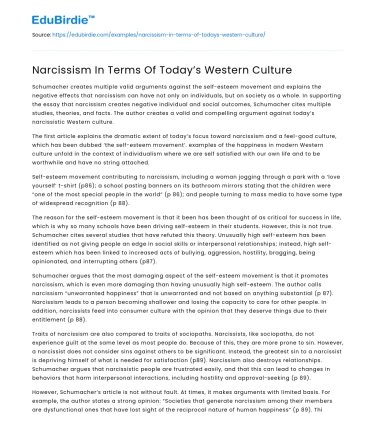Schumacher creates multiple valid arguments against the self-esteem movement and explains the negative effects that narcissism can have not only on individuals, but on society as a whole. In supporting the essay that narcissism creates negative individual and social outcomes, Schumacher cites multiple studies, theories, and facts. The author creates a valid and compelling argument against today’s narcissistic Western culture.
The first article explains the dramatic extent of today’s focus toward narcissism and a feel-good culture, which has been dubbed ‘the self-esteem movement’. examples of the happiness in modern Western culture unfold in the context of individualism where we are self satisfied with our own life and to be worthwhile and have no string attached.
Save your time!
We can take care of your essay
- Proper editing and formatting
- Free revision, title page, and bibliography
- Flexible prices and money-back guarantee
Self-esteem movement contributing to narcissism, including a woman jogging through a park with a ‘love yourself’ t-shirt (p86); a school pasting banners on its bathroom mirrors stating that the children were “one of the most special people in the world” (p 86); and people turning to mass media to have some type of widespread recognition (p 88).
The reason for the self-esteem movement is that it been has been thought of as critical for success in life, which is why so many schools have been driving self-esteem in their students. However, this is not true. Schumacher cites several studies that have refuted this theory. Unusually high self-esteem has been identified as not giving people an edge in social skills or interpersonal relationships; instead, high self-esteem which has been linked to increased acts of bullying, aggression, hostility, bragging, being opinionated, and interrupting others (p87).
Schumacher argues that the most damaging aspect of the self-esteem movement is that it promotes narcissism, which is even more damaging than having unusually high self-esteem. The author calls narcissism “unwarranted happiness” that is unwarranted and not based on anything substantial (p 87). Narcissism leads to a person becoming shallower and losing the capacity to care for other people. In addition, narcissists feed into consumer culture with the opinion that they deserve things due to their entitlement (p 88).
Traits of narcissism are also compared to traits of sociopaths. Narcissists, like sociopaths, do not experience guilt at the same level as most people do. Because of this, they are more prone to sin. However, a narcissist does not consider sins against others to be significant. Instead, the greatest sin to a narcissist is depriving himself of what is needed for satisfaction (p89). Narcissism also destroys relationships. Schumacher argues that narcissistic people are frustrated easily, and that this can lead to changes in behaviors that harm interpersonal interactions, including hostility and approval-seeking (p 89).
However, Schumacher’s article is not without fault. At times, it makes arguments with limited basis. For example, the author states a strong opinion: “Societies that generate narcissism among their members are dysfunctional ones that have lost sight of the reciprocal nature of human happiness” (p 89). This argument is based solely on the myth of Narcissus as well as the author’s personal opinion, which has been established throughout the article. However, this is a strong opinion that may need additional factual information to be stated appropriately.
Overall the essay creates a valid argument against the self-esteem movement, primarily because it supports narcissistic tendencies and behavior. Although many think that self-esteem drives happiness and success, too much self-esteem leads to negative effects, including narcissistic behavior. Author John Schumacher warns that within the self-esteem movement, one must be careful to not fuel one’s own self-esteem to the point that it becomes narcissistic. He makes his argument against narcissism fueled by the self-esteem movement effectively and on a generally factual basis. I will highly recommend this book to everyone to read






 Stuck on your essay?
Stuck on your essay?

